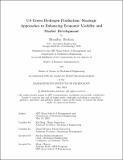US Green Hydrogen Production: Strategic Approaches to Enhancing Economic Viability and Market Development
Author(s)
Meehan, Brandon
DownloadThesis PDF (105.7Mb)
Advisor
Freund, Daniel
Deng, Sili
Terms of use
Metadata
Show full item recordAbstract
As the global imperative for sustainable energy solutions intensifies, green hydrogen emerges as a potential player in a sustainable energy future. This thesis explores the viability and economic landscape of green hydrogen production within the United States. It places emphasis on the pivotal role of renewable energy credit (REC) matching criteria and strategic operational adjustments in enhancing its economic feasibility. Through a detailed examination of the effects of hourly and annual REC matching, this study illuminates the complex interplay between public policy, business strategies, and the inherent variability of renewable energy sources.
Central to this investigation is the assessment of two primary levers which may change the underlying economics of green hydrogen: REC matching criteria, which dictate the temporal alignment between renewable energy generation and hydrogen production, and strategic electrolyzer curtailment, a novel operational strategy designed to optimize the sale of both hydrogen and electricity. The analysis utilizes robust datasets including 4 years of hourly wind and solar resource availability in the U.S. at a 3km resolution, 4 years of hourly nodal power prices, and infrastructural cost data.
The findings reveal significant regional disparities in the cost-effectiveness of green hydrogen production. The middle regions of the U.S., particularly Texas, emerge as optimal locations. These disparities are further nuanced by the chosen REC matching criteria, where less stringent annual matching notably reduces regional cost disparities by accommodating the variability of solar energy production. Moreover, strategic electrolyzer curtailment emerges as a critical mechanism for cost reduction, offering substantial savings, especially in regions characterized by high electricity price volatility.
This research contributes to the burgeoning field of green hydrogen studies by providing a comprehensive analytical framework that integrates technical, economic, and policy dimensions. It offers actionable insights for policymakers and industry stakeholders, suggesting pathways to enhance the competitiveness of green hydrogen. By meticulously balancing the imperative of sustainability with economic considerations, this thesis charts a course towards establishing green hydrogen as a significant contributor to the hydrogen market, poised to catalyze a profound shift in the U.S. decarbonization effort.
Date issued
2024-05Department
Massachusetts Institute of Technology. Department of Mechanical Engineering; Sloan School of ManagementPublisher
Massachusetts Institute of Technology